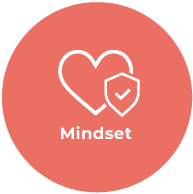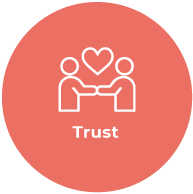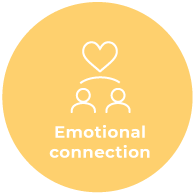What is a ‘good’ dialogue?
Major elements of dialogue
Object/subject: Background, personality, social milieu, values, degree of closeness of the relationship of the dialogue participants (incl. yourself)
Information/content: Content theme, information density,body language, emotional expression, and manner of interaction
Time/place: Temporal-spatial context, situation, communication channel, duration, frequency and number of conversations
A good dialogue involves empathy, accommodation, and shared expectations
Three points to consider when building good dialogue around disinformation

Understand that the dialogue should be sustained; do not be overly anxious to score points or to emerge victorious.

Observe how the other person receives, digests and passes on information, as well as the motivation behind their actions.

Dynamically adjust to the responses you receive. Formulate an appropriate course of action that is in tune with the setting that the dialogue is taking place.
Preparing properly
Dealing with difficult situations
Below, we list four common issues that can cause dialogue to break down. Click through to discover ways in which you can change your approach and resolve each problem.
Accumulating credit: A case of less haste, more speed
"Credit" in the financial sense indicates the trust banks are prepared to place in you. If you regularly top up your savings, banks will be more willing to trust you, and listen when you want a loan for a business venture, even if they don’t understand the market or the industry. The same is true when it comes to “credit” in the context of interpersonal relations. The more credit exists between two parties, the more they will listen to each when exchanging views on difficult topics. Credit can be accumulated by frequently asking after people, being considerate, lending a helping hand, and offering emotional support. The best approach is to accumulate credit over time, bit by bit through the course of our daily lives.

Trust, security and emotional connection
We often believe that facts, statistics and logical exposition are the most important parts of a dialogue, but the person with whom we are talking is not a machine. They are made of flesh and blood, and possess feelings and emotions. Trust, a feeling of security, and an emotional connection, are crucial yet often-overlooked elements in sustaining a meaningful dialogue.



How to engage in dialogue when faced with fake news: avoiding arguments or awkwardness

Person
Understanding the other|Who am I talking to?
Understanding the type of person you are talking to will make it easier for for you to find the most appropriate way of engaging them in conversation.
1
Individual background
2
The relationship you have with each other
3
Their attitude and approach to information

Scenario
Judging the conversation|The scenario or forum
Conversations in a Line group are different from those during a company dinner. Take note of the scenario in which the dialogue is taking place.
1
Online platforms:
communication software, social media sites,
2
Real-time situations:
one-on-one, private gatherings, the workplace, public areas

Info
Assessing information|What impact will this information have?
Not all fake news is cause for instant outrage. Try to take a moment to reflect and calmly point out why the information is incorrect.
1
Reflect on yourself
2
Consider the information

Goals
Thinking about conversation goals|What do I want to achieve?
1
Point out errors
2
Extend the conversation
3
Protect the relationship

Reply
Thinking how to respond|How should I reply?How do I extend the conversation?
You do not have to act "in the moment". Adjust how yourespond according to the venue, atmosphere and context. Returning to the subject later is often a better option.

Closing the conversation
There are three helpful things we can do when a dialogue is coming to an end:
1
Express gratitude to the other person
Express your sincere thanks to the other person for being willing to spend time discussing an issue that you both care about, and allow the conversation to end on a happy and comfortable note.
2
Wish each other well
As you conclude the conversation, let the other person know that you hope that everything goes well for them in the future.
3
Reflect on where you can improve
Spend a bit of time looking back and reflecting on what changes you could make, and the places you could improve were you to have the conversation over again.


Remember: No one is perfect right off the mark, but we can all improve on past performance.
We hope the guidance and tools in this article can help you engage in meaningful dialogues with the important people in your life. If things do get overwrought, and emotions get out of hand, remember there is always time to calm down and try a different approach next time. Sustaining the relationship is the key. Achieving productive dialogues may take a long time, so there is certainly no need to rush.



